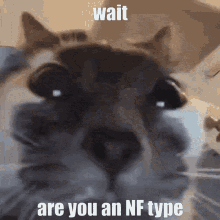We use cookies on our website for a number of purposes, including analytics, performance, and advertising. Learn more.
OK!
Boo
SIGN IN
How INFJs Handle Crisis: Navigating Turbulent Times Like Guardians
By Boo Last Updated: December 4, 2024
The INFJ personality type, often referred to as the "Advocate" or "Guardian," is known for its depth of empathy, idealism, and profound understanding of human emotions. In professional and academic settings, INFJs bring a unique blend of creativity and insight, often becoming the go-to individuals for conflict resolution and emotional support. Their ability to perceive the underlying emotions in others makes them invaluable team members, yet it also places them in a delicate position when faced with crises.
When crises arise, INFJs may struggle to balance their own emotional needs with their instinct to support others. Their sensitivity often leads them to internalize stress, which can result in withdrawal or feelings of overwhelm. This guide aims to explore how INFJs navigate tough times, highlighting their emotional responses, coping mechanisms, and resilience-building techniques, while also providing insights into when they might benefit from professional help.
Explore the INFJ At Work Series
- Understanding INFJ's Decision-Making Process
- How INFJ Approaches Personal Growth and Self-Improvement
- INFJ's Learning Style: How They Absorb and Apply Knowledge
- The INFJ Leadership Style
- The Creative Side of INFJ
- How to Bring Out the Best in INFJs
The Emotional Landscape of the INFJ
The emotional landscape of an INFJ is rich and complex, characterized by a deep sense of empathy and an acute awareness of the feelings of others. In times of crisis, this sensitivity can lead to intense emotional reactions, as they often absorb the distress of those around them. Understanding these emotional responses is crucial for INFJs to navigate their own feelings while providing support to others.
- Overwhelming empathy: INFJs may feel an intense emotional connection to the struggles of others, which can lead to emotional exhaustion. Their idealistic nature drives them to want to help, but this can sometimes result in them neglecting their own needs.
- Withdrawal: When faced with overwhelming stress, INFJs may retreat into themselves, seeking solitude to process their feelings. This withdrawal can be misunderstood as aloofness, but it's often a necessary coping mechanism for them to regain emotional balance.
- Conflict avoidance: INFJs typically strive for harmony and may avoid confrontation even in crises. This desire to maintain peace can lead to unresolved issues, which may resurface later if not addressed.
Coping Mechanisms for INFJs in Crisis
Coping mechanisms for INFJs during challenging times can vary widely, but they often rely on their introspective nature to process their emotions. Understanding these mechanisms can help INFJs find healthier ways to manage stress and navigate difficult situations.
Journaling to process emotions
One effective coping strategy for INFJs is journaling. When faced with a crisis, they can pour their thoughts and feelings onto paper, allowing them to clarify their emotions and gain perspective. For instance, after a particularly stressful week at work, an INFJ might spend an evening writing about their experiences, which can help them identify patterns in their emotional responses and develop strategies for future challenges.
Seeking solitude for reflection
INFJs often need time alone to recharge and reflect. During a crisis, they may choose to take a walk in nature or spend a quiet evening at home. This solitude allows them to process their feelings without the pressure of external expectations, enabling them to return to their social circles with renewed energy and clarity.
Engaging in creative outlets
Creative expression serves as a vital coping mechanism for INFJs. Whether through painting, writing, or playing music, these activities allow them to channel their emotions into something tangible. For example, an INFJ might write poetry during a tumultuous period, using the art form to express their innermost thoughts and feelings.
Connecting with trusted friends
While INFJs may initially withdraw during a crisis, they often find solace in confiding in a trusted friend. This connection can provide them with the emotional support they need to navigate their feelings. For instance, after experiencing a personal loss, an INFJ might reach out to a close friend for a heartfelt conversation, finding comfort in shared understanding.
Practicing mindfulness and meditation
Mindfulness practices can be particularly beneficial for INFJs in crisis. By engaging in meditation or deep-breathing exercises, they can cultivate a sense of calm and grounding. For example, an INFJ facing work-related stress might set aside a few minutes each day to meditate, helping them regain focus and emotional equilibrium.
Building Resilience as an INFJ
Building resilience is essential for INFJs, as it allows them to navigate life's challenges with greater ease. By developing emotional resilience, they can better manage their reactions during crises and emerge stronger.
Cultivating self-awareness
Self-awareness is a cornerstone of resilience for INFJs. By regularly reflecting on their emotions and triggers, they can better understand their responses to stress. For instance, an INFJ might keep a mood journal to track their emotional states, helping them identify patterns and develop coping strategies.
Practicing emotional regulation
Learning to regulate emotions is crucial for INFJs, particularly in high-stress situations. They can practice techniques such as cognitive reframing, which involves shifting their perspective on a challenging situation. For example, an INFJ might view a setback at work as an opportunity for growth rather than a failure, fostering a more positive mindset.
Embracing vulnerability
INFJs often fear being vulnerable, but embracing this aspect of themselves can lead to greater resilience. By allowing themselves to be open about their struggles, they can forge deeper connections with others. For instance, an INFJ who shares their feelings of anxiety with a friend may find that this openness strengthens their bond and provides them with the support they need.
Setting healthy boundaries
Establishing boundaries is vital for INFJs to protect their emotional well-being. They must learn to say no to demands that drain their energy, allowing them to focus on self-care. For example, an INFJ might decline an invitation to a large gathering when feeling overwhelmed, opting instead for a quiet night at home.
Engaging in community or support groups
Participating in community activities or support groups can enhance resilience for INFJs. By connecting with like-minded individuals, they can share experiences and gain valuable insights. For instance, an INFJ might join a local book club where they can discuss their favorite stories while also forming meaningful relationships.
when to seek professional help
While INFJs are often equipped with various coping strategies, there are times when professional help may be necessary. Recognizing the signs that indicate a need for support is crucial for maintaining emotional health.
Persistent feelings of sadness or hopelessness
If an INFJ experiences prolonged feelings of sadness or hopelessness, it may be time to seek professional help. These emotions can interfere with daily functioning and indicate underlying issues that require attention.
Difficulty managing stress or anxiety
When stress or anxiety becomes overwhelming, INFJs may find it challenging to cope on their own. Seeking support from a mental health professional can provide them with the tools and strategies needed to manage these feelings effectively.
Withdrawal from social connections
If an INFJ begins to withdraw from friends and family, it may signal a deeper emotional struggle. Professional support can help them address the root causes of their withdrawal and reconnect with their loved ones.
Changes in sleep or appetite
Significant changes in sleep patterns or appetite can be indicators of emotional distress. If an INFJ notices these changes persisting over time, it may be wise to consult a mental health professional for guidance.
Feeling overwhelmed by life's challenges
When life feels unmanageable, seeking professional help can provide INFJs with a fresh perspective and coping strategies. A therapist can help them navigate their emotions and develop a plan for moving forward.
FAQs
How can INFJs effectively communicate their needs during a crisis?
Effective communication can be challenging for INFJs, especially during emotional turmoil. They may benefit from practicing assertiveness and expressing their needs clearly to others.
What role does self-compassion play for INFJs in crisis situations?
Self-compassion is essential for INFJs, as it allows them to be gentle with themselves during tough times. Practicing self-kindness can help them navigate their feelings without judgment.
Are there specific mindfulness techniques that work best for INFJs?
Mindfulness techniques such as guided meditation, deep breathing exercises, and body scans can be particularly effective for INFJs, helping them cultivate awareness and emotional regulation.
How can INFJs balance their desire to help others with their own emotional needs?
INFJs can balance their desire to help others by setting healthy boundaries and prioritizing self-care. Recognizing their own needs is crucial for maintaining their emotional well-being.
What are some common misconceptions about INFJs during crises?
A common misconception is that INFJs are always calm and collected. In reality, they may experience intense emotions and need time to process their feelings, just like anyone else.
Conclusion
Navigating crises can be particularly challenging for INFJs, given their deep emotional sensitivity and desire to support others. By understanding their emotional landscape, employing effective coping mechanisms, and building resilience, they can emerge from tough times stronger and more self-aware. It's essential for INFJs to recognize when they need support, whether from friends, family, or professionals, as seeking help is a sign of strength. Ultimately, embracing their unique strengths as Guardians can lead to a more fulfilling and balanced life, even in the face of adversity.
MEET NEW PEOPLE
JOIN NOW
40,000,000+ DOWNLOADS
INFJ People and Characters
Universes
Personalities
Meet New People
40,000,000+ DOWNLOADS
JOIN NOW




















































